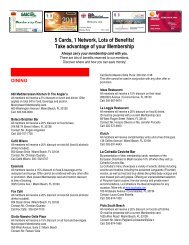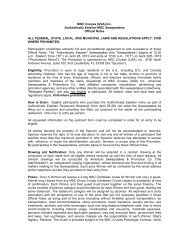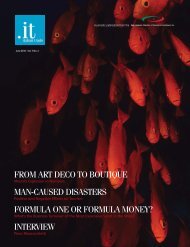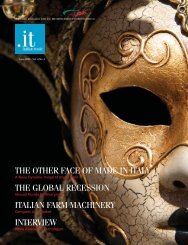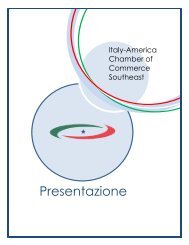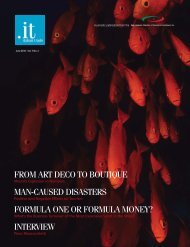italian fashion defines luxury - Italy-America Chamber of Commerce ...
italian fashion defines luxury - Italy-America Chamber of Commerce ...
italian fashion defines luxury - Italy-America Chamber of Commerce ...
Create successful ePaper yourself
Turn your PDF publications into a flip-book with our unique Google optimized e-Paper software.
BUSINESS<br />
Staying in the Green with a Red Economy<br />
bigger problem for <strong>luxury</strong> automakers like Maserati and Alfa Romeo.<br />
Because they are <strong>luxury</strong> goods, their prices correspond to the supply;<br />
economically speaking, there is purposefully a shortage <strong>of</strong> these items<br />
because not enough are or can be produced to satisfy the demand for<br />
such cars. During a recession, even those wealthy enough to afford<br />
such commodities are halting their purchasing plans. Companies such<br />
as funeral homes are said to be “recession-pro<strong>of</strong>” since one can safely<br />
assume that a recession doesn’t have much <strong>of</strong> an impact on death. Then<br />
there are industries, like tourism, which aren’t “companies” per se.<br />
Florida knows this consumer-driven industry quite well, which I mention<br />
in my .it Italian Trade June 2009 article (see “The Global Recession: Should<br />
Florida be Worrying” Volume 6, Issue 2, p. 18). The federal <strong>America</strong>n<br />
Recovery and Reinvestment Act <strong>of</strong> 2009 intends to pump up to $13.4<br />
billion in federal stimulus dollars during the next three budget years in<br />
hopes <strong>of</strong> helping our state avoid deep cuts and prevent tax increases that<br />
would further burden Florida’s families and businesses.<br />
Many companies respond to recessions by slashing their budgets in order<br />
to reduce costs, but Todd J. Hudak, a writer and strategist at Semphore,<br />
Inc. in Columbia, South Carolina disagrees. He actually encourages<br />
companies to increase their marketing budgets during an economic<br />
downturn. When the economy improves, these companies would have<br />
stayed fresh in consumers’ minds. Furniture exporters, <strong>of</strong> which our<br />
chamber has several, can survive the impact <strong>of</strong> the global recession by<br />
shifting their marketing strategy to the domestic market.<br />
Nancy F. Koehn, a business historian, author and pr<strong>of</strong>essor <strong>of</strong> business<br />
administration at Harvard Business School, stresses the need to understand<br />
the demand for your product; an area where once determined, trade<br />
missions become more useful. Emmanuel P. Padiernos, vice president<br />
for market development <strong>of</strong> the <strong>Chamber</strong> <strong>of</strong> Furniture Industries <strong>of</strong> the<br />
Philippines, said <strong>of</strong>fering goods to local buyers is an option for some<br />
exporters to sustain operations as the exports sector continues to reel<br />
from the global recession. Something also familiar to our chamber<br />
members are trade missions abroad in order to gain more customers.<br />
Padiernos currently has his sights set on Brazil, Russia, India, and China,<br />
which all have buoyant economies. Another older Italian company that is<br />
looking to expand its sales in the United States is Tortella, a manufacturer<br />
<strong>of</strong> spaders, rotary cultivators, rotary tillers, shredders/mulchers, power<br />
harrows and combines that was started by two brothers shortly after<br />
World War II. “Tortella has been exporting its products to Canada and<br />
the west coast <strong>of</strong> the United States for many years,” says Maria Rosa<br />
Bankston, sales representative for Tortella. “Now they want to go further<br />
into that market.” As part <strong>of</strong> that plan, she says, Tortella selected a new<br />
U.S. firm, Agricole International, headed by Chuck Peters, to represent<br />
its interests on the East Coast and Midwest regions <strong>of</strong> the United States.<br />
sufficiente a soddisfare la domanda del bene stesso. Durante una<br />
recessione, perfino coloro che sono sufficientemente abbienti<br />
da permettersi questo genere di beni tendono a rimandare le<br />
proprie decisioni d’acquisto. Aziende come quelle di pompe<br />
funebri, invece, si dicono “a prova di recessione”, dato che si puó<br />
tranquillamente supporre che una recessione non abbia un grosso<br />
impatto sul tasso di mortalitá. Poi ci sono settori, come quello<br />
del turismo, che non sono composti da “aziende” in se’ e che<br />
sono generalmente guidati dal comportamento del consumatore.<br />
Tali settori sono molto forti in Florida e sono menzionati nel mio<br />
articolo di giugno 2009 all’interno della rivista .it Italian Trade (vedi<br />
“The Global Recession: Should Florida be Worrying”, Volume 6,<br />
Num. 2, p. 18). Il “Federal <strong>America</strong>n Recovery and Reinvestment<br />
Act” del 2009 é stato creato per concedere ben $13,4 miliiardi<br />
in stimoli federali nel corso dei prossimi tre anni, nella speranza<br />
di aiutare il nostro governo ad evitare tagli pr<strong>of</strong>ondi ed aumenti<br />
delle tasse che andrebbero ulteriormente a gravare sulle famiglie<br />
e le aziende della Florida.<br />
Molte aziende rispondono alla recessione con tagli al budget per<br />
ridurre i costi, sebbene Todd J. Hudak, scrittore e stratega presso<br />
la Semphore, Inc. in Columbia, non condivida tale strategia. Il<br />
suo consiglio, al contrario, é di incrementare il proprio budget<br />
di marketing durante un periodo di recessione, in modo che,<br />
quando l’economia si sará ripresa, queste aziende si saranno<br />
mantenute vive nella mente dei consumatori. Gli esportatori di<br />
mobili, alcuni dei quali fanno parte della nostra camera, possono<br />
sopravvivere ad una recessione globale focalizzando la propria<br />
strategia di marketing sul mercato domestico.<br />
L’esperta di storia economica Nancy F. Koehn, autrice e docente<br />
presso la Harvard Business School, sottolinea la necessitá di<br />
comprendere la natura della domanda del proprio prodotto.<br />
Solo una volta capita appieno questa, le missioni commerciali<br />
acquistano una maggiore untilitá. Emmanuel P. Padiernos, vice<br />
presidente per lo sviluppo del mercato della Camera del Settore<br />
del Mobile nelle Filippine, ha affermato che <strong>of</strong>frire i propri beni<br />
ai compratori locali puó essere un’opzione per alcuni esportatori<br />
al fine di sostenere le proprie attivitá mentre le esportazioni<br />
continuano a vacillare a causa della recessione globale. Un’altra<br />
attivitá di cui i soci della nostra camera hanno familiaritá sono<br />
le missioni commerciali all’estero alla ricerca di nuovi clienti.<br />
Attualmente Padiernos ha i suoi occhi puntati su Brasile, Russia,<br />
India e Cina, paesi che presentano un’economia in crescita.<br />
Un’altra piu’ antica azienda <strong>italian</strong>a, che sta cercando di espandere<br />
il proprio business nel mercato degli Stati Uniti, é Tortella,<br />
produttrice di zappatrici, aratri e pale meccaniche, trinciatrici/<br />
mietitrici, erpici e mietitrebbia elettriche, fondata da due fratelli<br />
At times, being in the right time at the right place has led to the success<br />
<strong>of</strong> businesses. Amazon and Netflix have begun to gain consumers<br />
while many retailers have been complaining <strong>of</strong> the lack <strong>of</strong> them. Both<br />
companies experienced pr<strong>of</strong>its in the last quarter <strong>of</strong> 2008 – Netflix by<br />
.26



